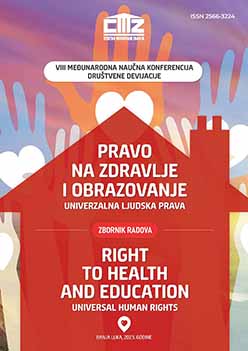FIZIČKO KAŽNJAVANJE DJECE U PORODIČNOM KONTEKSTU U CRNOJ GORI
CORPORAL PUNISHMENT OF CHILDREN IN THE FAMILY CONTEXT IN MONTENEGRO
Author(s): Ida KolinovićSubject(s): Social Sciences, Law, Constitution, Jurisprudence, Psychology, Sociology, Family and social welfare, Social Norms / Social Control
Published by: CENTAR MODERNIH ZNANJA
Keywords: children; family; corporal punishment; consequences; regulations; Montenegro;
Summary/Abstract: From generation to generation, delusion is transmitted, masked as the wisdom that "beating came out of heaven", which is why the application of physical punishment for educational purposes, throughout human history, has been justified as a method of educating and disciplining children. Empirical research conducted in Montenegro in the period from February 1st to June 30th, 2020,which included 522 citizens from the entire territory of Montenegro (northern, southern and central regions), revealed the worrying fact that as many as 80.8 % of citizens were beaten while growing up in the family, to a lesser or greater extent. As many as 10.3% of Montenegrin citizens were often beaten, while only 4.4% respondents stated that they were victims of abuse in childhood (most citizens don't perceive beating as violence). Those with experience of frequent beatings are the least willing to report to the institutions if a parent were to beat a child in the neighborhood. Family Law of Montenegro, Article 9, stipulates that a child must not be subjected to bodily punishment by parents, guardians and other persons who take care of the child. The Convention on the Rights of the Child, Article 19, prescribes the obligation to protect children from all forms violence, abuse and injury, while they are under the care of parents, legal representatives or any other person who takes care of the child, and the Universal Declaration of Human Rights, Article 25, states that everyone has right toa standard of living that provides health and well-being. WHO and various international studies have warned that bodily punishment is associated with negative outcomes for children including physical and mental health, impaired cognitive and socio-emotional development, poor educational outcomes, increased aggression and violence. Montenegro is obliged to implement preventive campaigns and education for the general public, especially parents, about the importance of respecting children's rights (according to domestic and international law), positive parenting and non-violent educational methods, in order to eliminate this negative practice from Montenegrin society.
Journal: DRUŠTVENE DEVIJACIJE
- Issue Year: VIII/2023
- Issue No: 8
- Page Range: 388-396
- Page Count: 9
- Language: Bosnian, Croatian, Serbian, Montenegrine

